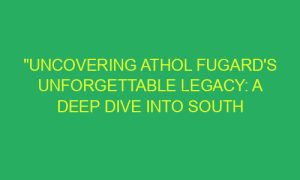Uncovering Athol Fugard’s Unforgettable Legacy: A Deep Dive into South Africa’s Renowned Playwright
Introduction:
Welcome to a fascinating journey into the life and works of Athol Fugard, one of South Africa’s most celebrated playwrights. Fugard’s stories have captivated audiences around the world, shedding light on the complex realities of apartheid and the human spirit’s resilience. Join us as we explore his remarkable legacy and the lasting impact it has had on theatre and society.
The Early Years: A Tale of Inspiration
Athol Fugard was born in Middelburg, South Africa, in 1932.
– He grew up in a racially divided society, which greatly influenced his later work.
– The injustices he witnessed sparked a passion for social change and an urge to tell stories that would challenge the status quo.
Breaking Boundaries: A Playwright’s Voice
Fugard’s plays often tackle themes such as racial inequality, identity, and the human condition.
– His most famous work, “Master Harold”… and the Boys, delves into the complexities of race relations during apartheid.
– By weaving together powerful dialogues and thought-provoking narratives, Fugard creates a deep connection between his characters and the audience.
The Impact of Fugard’s Plays
Fugard’s plays have left an indelible mark on the theatrical landscape, both in South Africa and beyond.
– They have served as a catalyst for conversations around social justice and human rights.
– Fugard’s commitment to shedding light on the struggles and triumphs of the marginalized has inspired generations of artists and activists.
Recognition and Awards
Fugard’s contribution to theatre has not gone unnoticed, as he has received numerous accolades throughout his career.
– He has been honored with prestigious awards like the Tony Award for Best Play and the Special Tony Award for Lifetime Achievement in Theatre.
– Fugard’s recognition is a testament to the profound impact his plays continue to have on audiences worldwide.
Frequently Asked Questions
1. What are some of Athol Fugard’s notable plays?
A: Some of Fugard’s notable plays include “Sizwe Banzi is Dead,” “The Island,” and “”Master Harold”… and the Boys.”
2. How did Fugard’s experiences in South Africa shape his writing?
A: Fugard’s experiences of growing up in a racially divided society deeply influenced his writing, inspiring him to tackle themes of social injustice and inequality.
3. What is the significance of “Master Harold”… and the Boys?
A: “Master Harold”… and the Boys explores the complexities of race relations during apartheid and highlights the destructiveness of prejudice.
4. How have Fugard’s plays impacted society?
A: Fugard’s plays have sparked important conversations about social justice, human rights, and the need for equality, leaving a lasting impact on both theatre and society.
5. Has Fugard received any awards for his work?
A: Yes, Fugard has received several prestigious awards, including the Tony Award for Best Play and the Special Tony Award for Lifetime Achievement in Theatre.
6. How has Fugard influenced future generations of artists?
A: Fugard’s commitment to telling stories that challenge the status quo has inspired countless artists and activists to use their craft as a tool for social change.
7. What does Fugard’s legacy in theatre teach us?
A: Fugard’s legacy teaches us the power of storytelling to shed light on social issues, evoke empathy, and inspire meaningful change.
In Conclusion
Athol Fugard’s impact on theatre and society cannot be understated. His stories have pierced through the barriers of racial division, urging audiences to confront uncomfortable truths and consider the transformative power of empathy. As we explore Fugard’s unforgettable legacy, let us be inspired to use our own voices to challenge injustice and advocate for a more inclusive world. Let Fugard’s plays continue to spark conversations and ignite the fire for change.
Remember, it is through the power of art that we can create a lasting impact. Join us in celebrating Athol Fugard’s legacy by experiencing his plays and sharing their messages with others. Together, we can make a difference.





